Public Health Physician
Entry Level Qualification
12
Career Fields
Medical Services
For Specially Abled





Career Entrance Exam
About Career
PARTICULARS | DESCRIPTION |
Name | Public Health Physician |
Purpose | Analyze And Assess Public Health Problems |
Career Field | Medical Services |
Required Entrance Exam | NEET UG, NEET PG, JIPMER MSC/MPH, AIIMS MSC, AIIMS PG INICET |
Average Salary | 400000 - 800000 Rs. Per Year |
Companies For You | WHO, CDC, NIH & Many More |
Who is Eligible | Graduate |
1. As a Public Health Physician, you will be dedicated to wellness & health protection in communities to prevent epidemics and ensure the quality & accessibility of health services.
2. The World Health Organization (WHO) is the international authoritative agency that deals with global public health issues, provides leadership on matters critical to health, and sets norms & standards for promoting & monitoring services.
3. However, most countries have their government public health agency, mostly called the Ministry of Health, responsible for domestic health issues.
Key Roles and Responsibilities
As a public Health Physician/ Public Health Consultant, you will be engaged with one or more of the following roles & responsibilities as well as other associated duties:
1. You will be dedicated to community wellness & health protection to prevent epidemics, prevent the spread of disease, protect against environmental hazards, prevent injuries, promote & encourage healthy behaviors, respond to disasters, assist communities in recovery, and assure the quality & accessibility of health services.
2. You will assist in advancing health strategy agendas, programs, and services with community partners & providers to decrease chronic disease & preventable deaths, communicable/ non-communicable diseases, improving service delivery systems, pursuing policy, preventing adverse environmental changes, and promoting healthy choices by all residents to improve the population's health.
3. You will assist in the development of policies, procedures & protocols for public health strategies & initiatives and ensure quality management of public health issues, including clinical services in centralized programs & regions, and in the community as a whole.
4. You will actively participate in the planning and implementation of such policies, strategies, & practices to advance the initiatives & visions for healthy, safe, & thriving communities (urban, semi-urban, rural, backward, and underdeveloped) throughout a region.
5. You will coordinate with media staff to present public health information & community level statistics to the media and members of the community; collaborate in planning & service provision with stakeholders; assess data obtained from the community to determine community needs.
6. You will plan program needs & progress; supervise officials, technicians & other staff, and provide oversight regarding educational opportunities for students, professionals, and fellows.
7. You will have to develop a profound understanding of market research, consumer segmentation, family typologies, and social behavior.
8. You will have to be a highly effective communicator capable of addressing sensitive public health issues with media & community groups as well as successfully reaching out & establishing relationships with community leaders and organizations.
Career Entry Pathway
After completing Class 10 and Class 11-12 Physics, Chemistry, and Mathematics along with any other subject as per the scheme of studies, you can go for graduation in medicine (MBBS-Bachelor of Medicine, Bachelor of Surgery) which is usually for 5 years. Thereafter go for MD in ‘Community Health Administration’ or ‘Preventive & Social Medicine’ or ‘Community Medicine’.
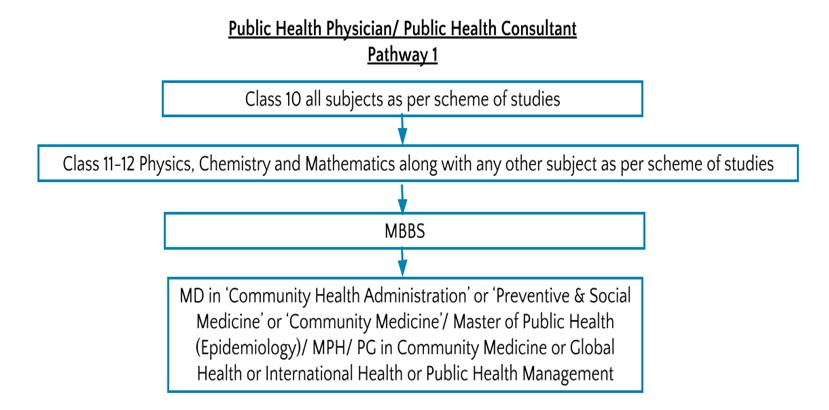
After completing Class 11-12 Physics, Chemistry, and Mathematics along with any other subject as per the scheme of studies, you can go for graduation in medicine (MBBS-Bachelor of Medicine, Bachelor of Surgery) which is usually for 5 years. Thereafter go for MD in ‘Community Health Administration’ or ‘Preventive & Social Medicine’ or ‘Community Medicine’.
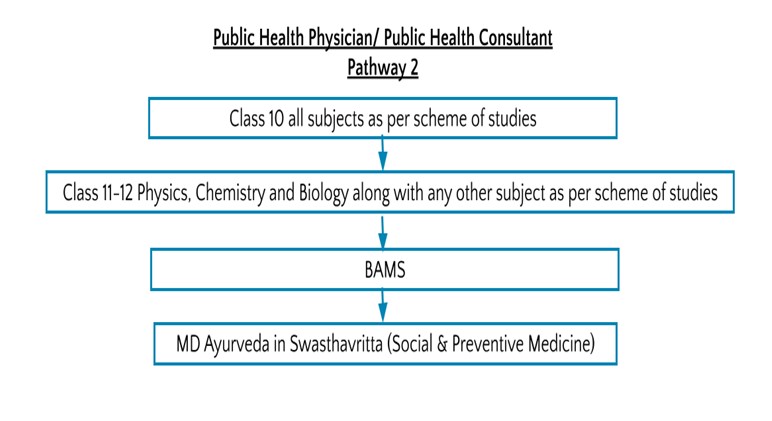
After completing Class 11-12 Physics, Chemistry, and Biology along with any other subject as per the scheme of studies, you can go for a BAMS degree and then pursue an MD in Ayurveda in Swasthavritta (Social & Preventive Medicine).
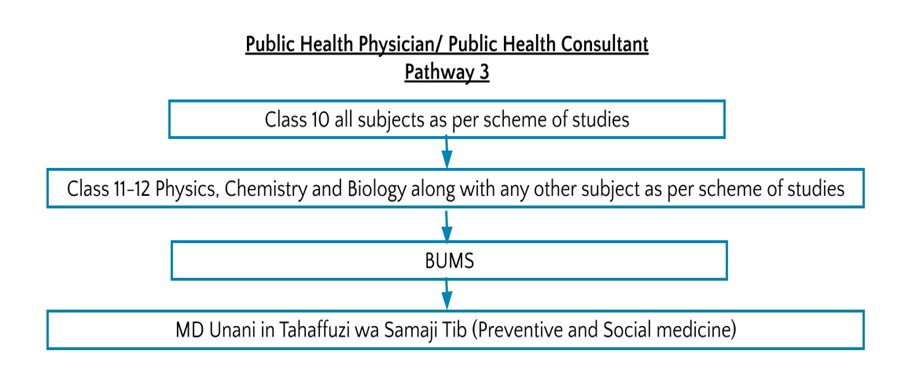
After completing Class 11-12 Physics, Chemistry, and Biology along with any other subject as per the scheme of studies, you can go for a BUMS degree and then pursue MD Unani in Tahaffuzi wa Samaji Tib (Preventive and Social medicine).
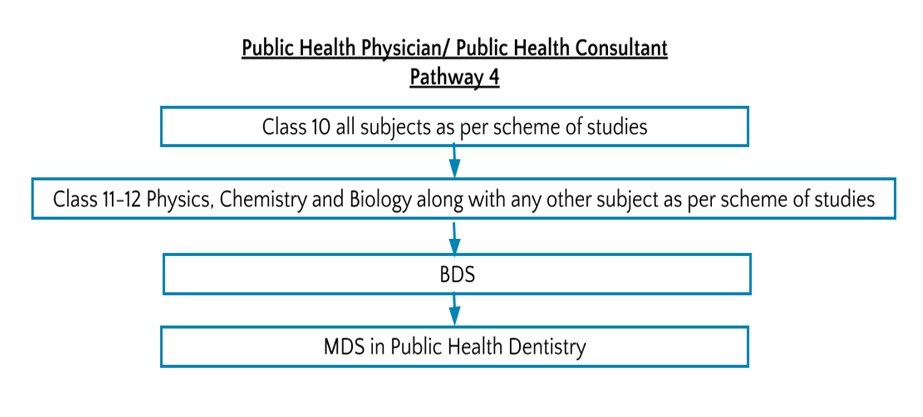
After completing Class 11-12 Physics, Chemistry, and Biology along with any other subject as per the scheme of studies, you can go for BDS and then complete MDS in Public Health Dentistry.
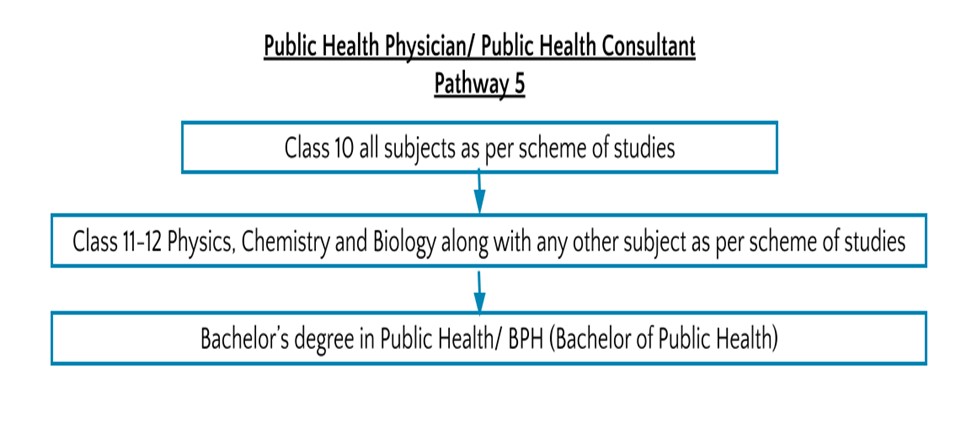
After completing Class 11-12 Physics, Chemistry, and Biology along with any other subject as per the scheme of studies, you can enroll for a Bachelor’s degree program in Public Health or BPH (Bachelor of Public Health).
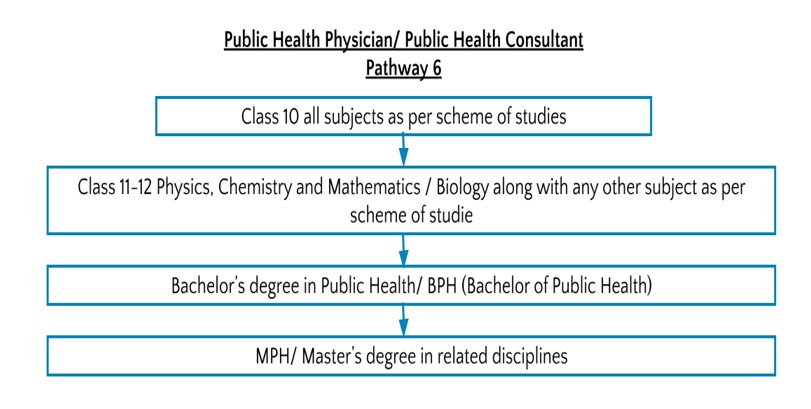
After Class 11-12 Physics, Chemistry, and Mathematics / Biology along with any other subject as per the scheme of studies, you can enroll for a Bachelor’s degree program in Public Health or BPH (Bachelor of Public Health). Thereafter, go for a 2 years Masters of Public Health program (MPH) or a Master’s degree in Community Medicine/ Global Health/ International Health/ Public Health Management.
Required Qualification & Competencies
To get into this field, you will need to pass the Class 10 examination with Science, Mathematics, along with any other subjects. Then you must complete Class 11-12 with any of the following combinations of subjects:
1. Class 11-12 in Science stream with Physics. Chemistry, Biology
2. Class 11-12 in Science stream with Physics. Chemistry, Mathematics
3. Class 11-12 in Science stream with Physics, Chemistry, and Mathematics or Biology
4. Class 11-12 in any stream with Mathematics
5. Class 11-12 in any stream
After Class 11-12:
1. You can go for a Bachelor’s in Public Health.
2. Bachelor's degree in Life Sciences (Microbiology, Biochemistry, Biotechnology, Botany, Zoology), Biostatistics
3. You can go for a Bachelor’s degree in Medicine (MBBS), Dental Surgery (BDS), Veterinary Sciences (B V Sc), Pharmacy (B Pharm.), AYUSH, Physiotherapy, Nursing, Chemistry
4. You can go for a Bachelor’s in Political Science/ Demography/ Sociology/ Public Administration/ Social Work/ Public Health/ Social Sciences
You can study for a Bachelor’s / Master’s / Doctoral degree in any of the following fields (Note that all these fields may not offer you a degree at all three levels, that is in Bachelor’s, Master’s, and Doctoral. Some fields may offer a degree only at the Master’s or at the Doctoral level):
1. Public Health
2. Health Policy and Health Finance
3. Public Health (Social Science)
4. Public Health Policy
5. Social Epidemiology
6. Public Health (Public System)
7. Public Health Dentistry
8. Public Health Nursing
9. Public Health (Medicine Specialty)
10. Veterinary Public Health
MINIMUM EDUCATION REQUIRED | MAXIMUM EDUCATION REQUIRED |
Under Graduate Undergraduate Degree / Honours Diploma / Graduate Diploma (equivalent to a Degree) Programs for which the minimum eligibility is a pass in Higher Secondary / Class XII School Leaving examination. | Doctoral All Ph.D. or equivalent degree programs for which the minimum eligibility is a Postgraduate or a Pre-Doctoral degree. |

Competencies Required
Interests
1. Social: You should have an interest in Social Occupations. Social occupations involve helping or assisting others; these involve working with and communicating with people to provide various services; these may involve educating and advising others.
2. Investigative: You should have an interest in Investigative Occupations. Investigative occupations involve working with ideas and quite a lot of thinking, often abstract or conceptual thinking. These involve learning about facts and figures; involve the use of data analysis, assessment of situations, decision making, and problem solving.
3. Conventional: You should have interests in Conventional Occupations. Conventional occupations involve repetitive and routine tasks as well as fixed processes or procedures for getting things done. These occupations involve working more with data, systems, and procedures and less with ideas or creativity.
Abilities
1. Abstract Reasoning: The ability to understand ideas that are not expressed in words or numbers; the ability to understand concepts that are not clearly expressed verbally or otherwise.
2. Deductive Reasoning: The ability to apply general rules and common logic to specific problems to produce answers that are logical and make sense. For example, understanding the reasons behind an event or a situation using general rules and common logic.
3. Emotional Intelligence: The ability to understand your own and others' emotions and feelings; empathy for others; adjusting your behavior or self-control and self-regulation according to others' emotions and situations.
4. Hand-Eye Coordination: The ability to make quick and precise hand movements as per visual observations and understanding (that is, what you see and comprehend).
5. Inter-Personal: The ability to build and maintain good relationships with others at workplaces and elsewhere.
6. Problem Sensitivity: The ability to tell when something is wrong or is likely to go wrong. It does not involve solving the problem, only recognizing there is a problem.
7. Selective Attention: The ability to concentrate on a task over a long period without being distracted.
8. Verbal Reasoning: The ability to think and reason with words; the ability to reason out ideas expressed in words.
9. Written Comprehension: The ability to read and understand information and ideas presented in writing.
Knowledge
1. Biological Sciences: Knowledge of plants and animals, their anatomical structure, cell structure, tissues, physiological functions, evolution, and all other related aspects.
2. English Language: Knowledge about English grammar, words, spelling, sentence construction, using English to communicate with others, reading in English, etc.
3. Healthcare Science and Services: Knowledge of different fields which are related to offering various types of healthcare services to people; assisting physicians and surgeons to carry out diagnosis, treatment, and prevention of human diseases, ailments, and disorders. This includes knowledge of different practices apart from medicine which are used to treat and prevent human diseases or to provide holistic healthcare and wellness. This also includes knowledge about drugs and medicines.
4. Personal Care Service: Knowledge of how to provide various assistance and services to others. This includes looking after the needs of individuals, understanding what they need, and providing all assistance at home or elsewhere.
Skills
1. Active Listening: Giving full attention to what other people are saying, understanding the points being made by others, asking questions, etc.
2. Coordination: Skills in working together with other people to get things done.
3. Critical Thinking: Skills in the analysis of complex situations, using logic and reasoning to understand the situations and take appropriate actions or make interpretations and inferences.
4. Judgment and Decision Making: Skills in considering the pros and cons of various decision alternatives; considering costs and benefits; and making appropriate and suitable decisions.
5. Problem Solving: Skills in analysis and understanding of problems, evaluating various options to solve the problems, and using the best option to solve the problems.
Personality
1. You are always or mostly organized in your day-to-day life and activities.
2. You are always or mostly a soft-hearted person.
3. You are always or mostly helpful to others.
4. You are always or mostly caring, supportive, sympathetic, and kind to others.
5. You remain calm in difficult situations sometimes but some other times you are anxious.
6. You act independently sometimes but do not do so at some other times.
7. You always or mostly prefer to stick within a routine or carry out routine and repetitive activities.
Career - Job Opportunities & Profiles
1. The profession of public health is very diverse. People work for many different types of organizations doing many different kinds of jobs for a wide range of pay.
2. For example, an epidemiology student often looks for a job as an epidemiologist and a healthcare organization and policy student might look for a job in health management.
3. All public health students have a base of knowledge in the fundamental areas of public health: statistics, epidemiology, health behavior, environmental health, and health policy.
Specialisation Tracks In This Career
1. Public Health Scientist
Public Health Scientists work in the area of preventing & managing noncommunicable diseases (NCDs), injuries as well as communicable diseases (such as HIV, and STDs) through designing, implementing, managing, and evaluating qualitative research, policy research, participatory research as well as intervention programs in various health promotion settings, large scale group randomized trials. They conduct health impact assessments and ethnographic research through community trials among adolescents, youth, middle-aged, or the elderly to obtain statistical data in real-life settings. They design outlines for such research processes; determine appropriate methodologies to yield a positive project outcome; communicate research objectives and finally analyze transcripts & produce reports addressing the defined research objectives.
2. Public Health Physician/ Public Health Officer
Public Health Physicians/ Officers are usually medicine graduates with an advanced degree in epidemiology or public health. They are dedicated to community wellness & health protection to prevent epidemics, prevent the spread of disease, prevent injuries, promote & encourage healthy behaviors, respond to accidents, assist communities in recovery, and assure the quality & accessibility of health services. They also assist in advancing health strategy agendas, programs, and services with community partners & providers to decrease chronic disease & preventable deaths, improving service delivery systems, and promoting healthy choices by all residents to improve the population's health. They form integral parts of the planning and implementation processes of policies, strategies, & practices to ensure healthy, safe, & thriving urban, semi-urban, rural, backward, and underdeveloped communities.
3. Epidemiologist
Epidemiologists are responsible for carrying out a full range of complex epidemiologic and surveillance activities. They provide scientific guidance & support to assist public health partners in collecting, evaluating, analyzing, and disseminating surveillance data. They investigate & analyze information concerning the prevention, impact & control of communicable, chronic diseases, environmentally-induced diseases, and other types of epidemics or disease outbreaks. They participate in the development, implementation, & evaluation of clinical interventions, processes, and measures for improving & monitoring clinical quality across infected, exposed, or vulnerable communities. They collaborate with internal & external partners to enhance the implementation of surveillance activities. They also lead or co-author scientific products including peer-reviewed manuscripts, presentations, technical reports, and internal briefings.
4. Occupational Health and Safety Specialist/ Consultant
Occupational Health and Safety Specialists review, evaluate, & analyze work/ occupational environments as well as design programs & procedures to control, eliminate, and prevent disease or injury caused by chemical/ physical/ biological agents or ergonomic factors governing the health and safety of individuals in a particular profession. They conduct periodical audits &inspections and enforce adherence to laws & regulations too. They recommend measures to protect workers from potentially hazardous work methods, processes, or materials. They investigate accidents to identify causes or to determine how such accidents might be prevented in the future. They may collect samples of gases, dust, vapors, or other potentially toxic materials for performing laboratory analyses or physical inspections to detect disease or to assess purity or cleanliness.
Career Growth
1. If you join as a Trainee/ Program Intern/ Operations Intern/ Support Intern/ Research Intern/ Graduate Intern, then after completion of your training, you will be positioned as a Public Health Officer, Public Health Consultant, Public Health Expert, Medical Officer, Public Health Physician, Occupational Health and Safety Specialist/ Consultant, Family Practice Physician, Public Health Scientist, Community Health Workers. However, if you join after your MD or post-graduation in a relevant discipline, you can surpass traineeship/ internship to directly get a job in any of these positions.
2. After 6-10+ years of experience, you can expect to become a Key Account Manager in public Health; Group Manager; Senior Manager; Clinical Advisor and chairman; or Assistant Vice President- Public Health Practice.
3. Then after 15+ years of experience, you may grow as a Division Dean; General Manager; Associate Director; Joint Director (Medical and health Services); Medical Director/ Senior Medical Director; Director-Programme Management/ Senior Director/ Chief Medical Officer (CMO); Executive Director; Chief Executive Officer or to similar roles.
Salary Offered
1. At the entry-level jobs with private companies, after your post-graduation, you may expect to get about Rs. 30,000 – 60,000 or even more a month. In junior-level jobs (after 4-5 years of post-graduation), you can make about Rs. 40,000 – 80,000 or more per month.
2. In mid-level jobs with private companies in India, you can expect to earn about Rs. 70,000 – 1,20,000 or even more a month.
3. In senior-level jobs with private companies in India, you can expect to earn about Rs. 85,000 – 2,00,000 or even more a month.
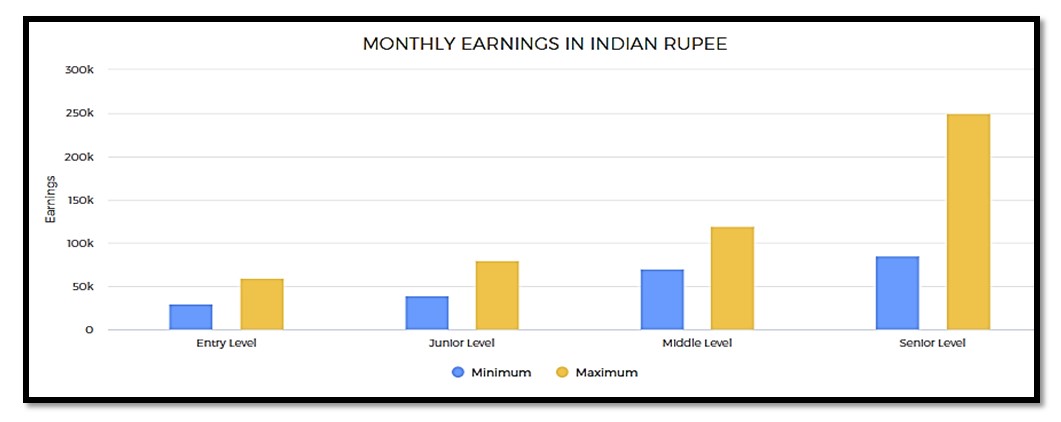
Monthly Earnings In Indian Rupee
Entry Level | Junior Level | Mid Level | Senior Level | ||||
Min Earning | Max Earning | Min Earning | Max Earning | Min Earning | Max Earning | Min Earning | Max Earning |
30000 | 60000 | 40000 | 80000 | 70000 | 120000 | 85000 | 250000 |
1. Entry level: 0 - 2 years of work experience
2. Junior Level: From 1 to 12 years of work experience
3. Mid-Level: From 5 to 20+ years of work experience
4. Senior Level: From 10 to 25+ years of work experience (there could be exceptions in some high-end technical, financial, engineering, creative, management, sports, and other careers; also shortly, people will reach these levels much faster in many careers and some careers, these levels will have no meaning as those careers will be completely tech skill driven such as even now, there is almost no level in a Cyber Security Expert’s job)
Work Activities
1. Addressing grievances and resolving conflicts - Handling complaints and grievances to resolve; resolving conflicts.
2. Analyzing and interpreting data and information - Analysis of data and information to find facts, trends, reasons behind situations, etc.; interpretation of data to aid in decision-making.
3. Assessing and determining compliance with standards, laws, rules, and guidelines - Using relevant information, auditing information, processes, and systems to determine whether organizations or people are complying with standards, laws, rules, and guidelines.
4. Assisting and caring for people - Assisting people in availing of services; taking care of people in different situations; offering help and services to others.
5. Communicating with co-workers and others - Communicating with people in writing, verbally or otherwise inside your workplace and various other people who have professional relationships with your place of work including vendors, government officials, etc., or with people at large.
6. Developing and maintaining interpersonal relationships - Developing professional relationships with co-workers and others outside organizations and maintaining good relationships.
7. Inspecting situations, events, and people - Inspecting situations, events, and people to understand the reasons and causes for the situation or events to happen; inspecting people to understand reasons behind their behavior and actions.
8. Making decisions and solving problems - Analysis of data and information; evaluation of alternative decisions and results of decisions; taking the right decisions and solving problems.
9. Organizing, planning, and prioritizing tasks - Planning and organizing tasks to achieve work goals; prioritizing tasks to achieve goals and making the best use of the time available.
10. Providing advice and consultation to others - Giving advice or consultation to others about various issues, conceptual matters, know-how, scientific matters, products, or services.
11. Strategic planning - Developing visions and goals, developing strategies and action plans for achieving visions and goals.
12. Training and teaching - Understanding the educational and training needs of others, developing training programs and educational programs, conducting training programs, teaching and instructing others.
13. Working directly with people - working directly with people to offer them products and services, providing assistance, etc.
14. Working in a team - Working in a team of people; developing a team; and maintaining professional relationships among team members.
Future Prospects
1. The future of this pathway seems bright as the industry statistics are extremely encouraging.
2. Public Health professionals are in dearth while the demand is rocketing each day as about 30 babies are born every minute and up to 1.5 million babies are born every month in this country. On a happier note, the Government of India is planning to increase public health spending to 2.5% of the country's GDP.
3. With the increase in the competition, businesses are looking to explore the latest dynamics & trends which will have a positive impact on their business.
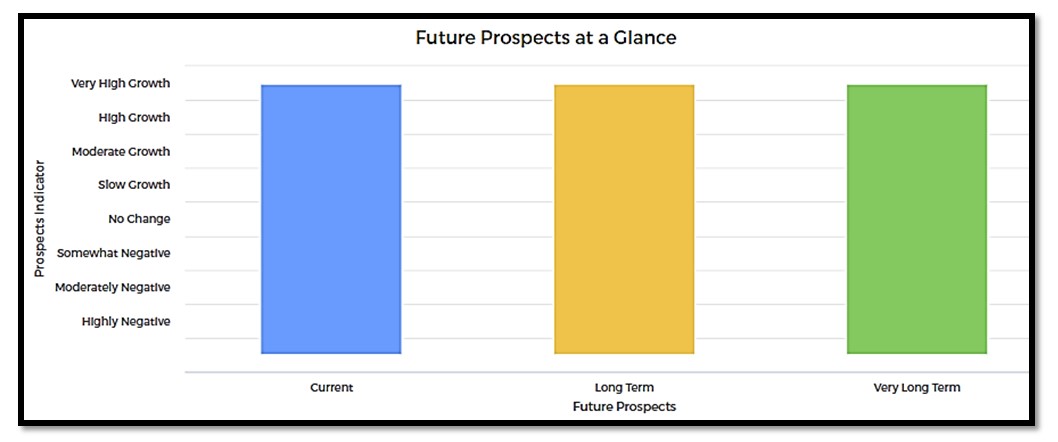
Future Prospects At A Glance
Current (0-1 year) | Long Term (2-5 years) | Very Long Term (6-10 years) |
Very High Growth | Very High Growth | Very High Growth |


